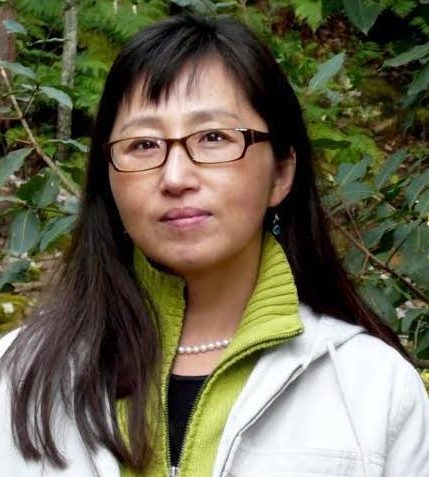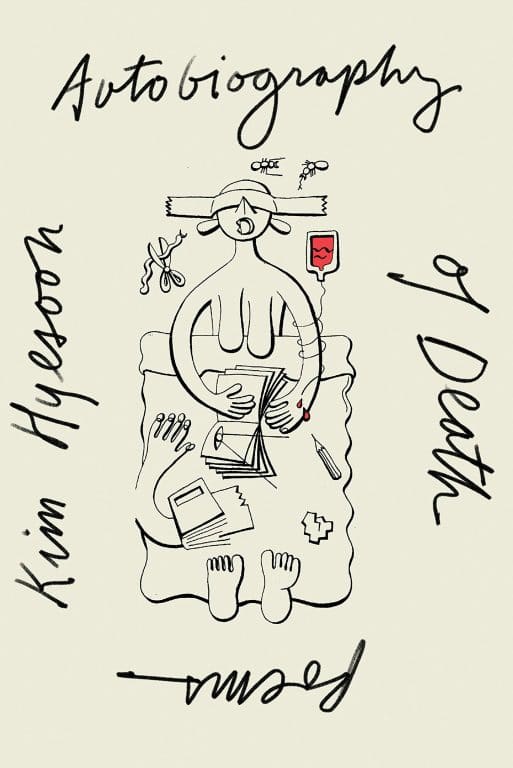
Born in Seoul, South Korea, Don Mee Choi is the author of DMZ Colony, which won the 2020 National Book Award for Poetry. Her other publications include Hardly War, The Morning News Is Exciting, and several chapbooks and pamphlets of poems and essays. She has received numerous fellowships and prizes: 2011 Whiting Award, 2016 Lannan Literary Fellowship, 2012 & 2019 Lucien Stryk Translation Prize, 2019 DAAD Artists-in-Berlin Fellowship, 2019 International Griffin Poetry Prize for her translation of Autobiography of Death by Kim Hyesoon, 2021 Guggenheim Fellowship, and 2021 MacArthur Fellowship. She was selected as one of the inaugural 2021 Royal Society of Literature International Writers. She was also a 2021 Guest Picador Professor at Leipzig University, Germany.
Don Mee Choi has translated several collections of Kim Hyesoon’s poetry, published by Zephyr Press, Action Books and New Directions. She has served as a translator for the International Women’s Network Against Militarism (IWNAM). Visit her pages at Wave Books, Whiting Awards, Lannan Foundation, Berliner Künstlerprogramm, John Simon Guggenheim Memorial Foundation and MacArthur Foundation.

Judges’ Citation
In the grievous wake of the Sewol Ferry incident of 2014, the Korean poet Kim Hyesoon composed a cycle of forty-nine poems – one for each day the dead must await reincarnation – to produce a harrowing work of shock, outrage, and veneration for the children lost to this disaster.
In the grievous wake of the Sewol Ferry incident of 2014, the Korean poet Kim Hyesoon composed a cycle of forty-nine poems – one for each day the dead must await reincarnation – to produce a harrowing work of shock, outrage, and veneration for the children lost to this disaster. Through Don Mee Choi’s extraordinary translations, we hear the clamorous registers of Kim’s art – a transnational collision of shamanism, Modernism, and feminism – yield ‘a low note no one has ever sung before.’ That otherworldly tone may sound like life itself, the poet sings, ‘for even death can’t enter this deep inside me.
Selected poems
by Don Mee Choi
After you’ve gone don’t go, don’t
After you’ve come don’t come, don’t
When you depart, they close your eyes, put your hands together and cry
don’t go, don’t go
But when you say open the door, open the door, they say don’t come, don’t
come
They glue a paper doll onto a bamboo stick and say don’t come, don’t come
They throw your clothes into the fire and say don’t come, don’t come
That’s why you’re footless
wingless
yet all you do is fly
unable to land
You’re visible even when you hide
You know everything even without a brain
You feel so cold
even without a body
That’s why this morning the nightgown hiding under the bed
is sobbing quietly to itself
Water collects in your coffin
You’ve already left the coffin
Your head’s imprint on the moon pillow
Your body’s imprint on the cloud blanket
So after you’ve gone don’t go, don’t
So after you’ve come don’t come, don’t
Copyright © 2016 by Kim Hyesoon / 2018 by Don Mee Choi
After You’re Gone / DAY SIX
the Korean written by Kim Hyesoon
Hence breath
Then breath
Next breath
Subsequent breath
Because breath
Such breath
And breath
Same breath
Thereafter breath
Thus breath
Always breath
Eventually breath
Perpetually breath
Yet breath
However breath
Therefore breath
In spite of breath
Breath till the bitter end
Death breathes and you dream but
it’s time to remove the ventilator from death
it’s time to shatter the dream with a hammer
Copyright © 2018
Asphyxiation / Day 46
It’s cold, for you’ve come out from a warm body
It’s bright, for you’ve come out from a dark body
It’s lonely, for you’ve lost your shadow
Icy, like soil dug out from a flower pot
Sunny, like the sunlight fish stare at beneath the sheet of ice
Hot, like when lips touch a frozen door knob
Cold again, a bulb-like heart is half frozen
Cold again, as if zero is divided by zero
a glass divided by glass
It’s alright, alright
for you’re already dead
The place where you’ve shed yourself, the cold arrived, drained of all the
red from your body
Copyright © 2016 by Kim Hyesoon 2018 by Don Mee Choi
Winter’s Smile / DAY NINETEEN
the Korean written by Kim Hyesoon
- Don Mee Choi’s Website
- Interview on Translation Words without Borders
- A conversation with Don Mee Choi Lantern Review
- Don Mee Choi Feature MacArthur Foundation